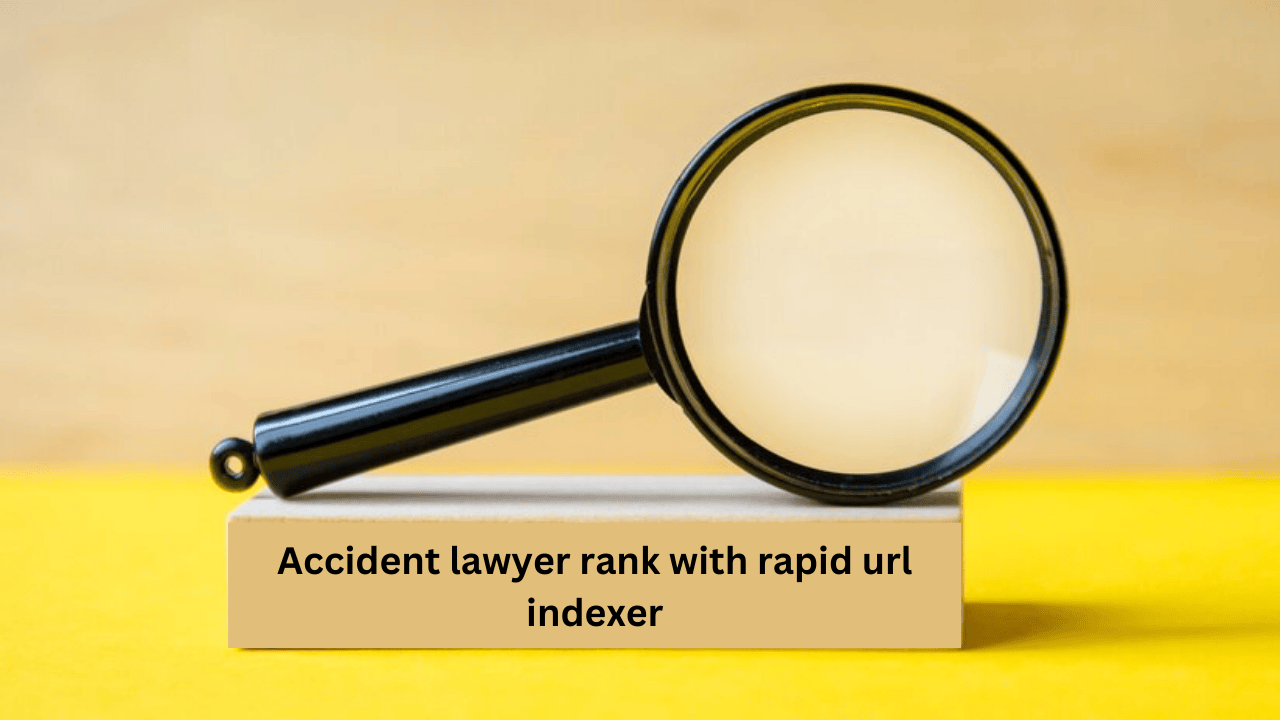Accident lawyer Rank with rapid url indexer the highly competitive world of legal services, particularly for accident lawyers, ranking at the top of search engine results is essential for attracting new clients. With the legal industry being saturated, standing out from the crowd is not an easy feat. However, by leveraging the right digital marketing strategies, such as using a rapid URL indexer, accident lawyers can improve their website’s ranking, get indexed faster by search engines, and increase online visibility. This article delves into the importance of ranking for accident lawyers and how tools like a rapid URL indexer can make a significant impact on SEO efforts.
Understanding the Importance of SEO for Accident Lawyers
SEO, or Search Engine Optimization, is critical for accident lawyers looking to connect with potential clients online. When someone is involved in a car accident or a personal injury situation, they often turn to Google to find a lawyer who can represent them. The competition is fierce, and the lawyers who appear on the first page of search results are more likely to receive inquiries and cases. In fact, studies show that 75% of users never scroll past the first page of Google results, making it crucial for accident lawyers to secure a high ranking.
To rank well on search engines, accident lawyers need a comprehensive SEO strategy. This includes optimizing their website content for relevant keywords, building quality backlinks, and ensuring their website provides a user-friendly experience. However, one often overlooked aspect of SEO is the speed at which your content gets indexed by search engines.
What is Rapid URL Indexing?
Rapid URL indexing gets a webpage or website indexed by search engines quickly after publication or updates. In SEO, indexing means search engines like Google crawl your site and add it to their database, making it available in search results. The sooner search engines index your website, the faster it can start ranking for the target keywords you are optimizing for.
Indexing can sometimes take days or even weeks, especially for new or low-authority websites. This can be frustrating, particularly for accident lawyers who want their content to show up quickly in response to emerging trends or high-traffic events (such as a local car accident). Fortunately, tools like rapid URL indexers can significantly reduce the time it takes for a website or webpage to be index.
How Does a Rapid URL Indexer Work?
A rapid URL indexer expedites the indexing process by notifying search engines about new or updated content on your website. When you use a rapid URL indexer, it pings search engines like Google, alerting them that your URL is ready to be crawl and add to their database. It bypasses the traditional waiting period and indexes your site faster.
For accident lawyers, this is a game-changer. Rapid indexing tools allow you to stay ahead of the competition by ensuring that your latest blog post, case study, or legal resource is discoverable on search engines almost immediately after publication. This increased visibility can help you secure top rankings for time-sensitive search queries, such as local accident news or trending legal topics.
Benefits of Using a Rapid URL Indexer for Accident Lawyers
There are several key benefits to using a rapid URL indexer as part of your SEO strategy:
- Faster Rankings: By speeding up the indexing process, rapid URL indexers allow your content to rank sooner. This is crucial in competitive niches like accident law, where early visibility can make a significant difference in capturing potential clients.
- Improved Organic Traffic: Once your site is index, it can start appearing in search results, driving organic traffic to your website. With rapid indexing, you can start seeing traffic sooner, which is especially beneficial for new content or timely legal updates.
- Stay Ahead of Competitors: In the legal industry, timing is everything. Rapid URL indexing gives accident lawyers an edge over competitors who rely on slower, more traditional indexing methods.
- Optimize for Time-Sensitive Content: Legal topics related to accidents, laws, or recent case victories are often time-sensitive. Rapid indexing ensures that your content gets notic during the peak of interest, increasing your chances of capturing search traffic related to current events or local incidents.
- Faster Keyword Ranking: When Googleaccident lawyer rank with rapid url indexer your content, it also starts evaluating it for relevant keywords. By using rapid indexing tools, you enable your content to start climbing the rankings for target keywords sooner, allowing you to secure higher positions in search engine results pages (SERPs).
How to Integrate Rapid URL Indexing into Your SEO Strategy
For accident lawyers looking to optimize their website’s SEO with rapid indexing. Here are some practical steps to integrate this technique into your overall strategy:
- Optimize On-Page SEO: Before using any indexing tool, ensure that your website is optimize for on-page SEO. This includes using proper title tags, meta descriptions, headers, and keyword-rich content. Search engines prioritize well-optimized websites for indexing.
- Use a Reliable Rapid Indexer: There are several tools available that offer rapid URL indexing services, such as IndexNow, RapidIndexer, and OneHourIndexing. These tools notify search engines like Google and Bing about new accident lawyer ranks with rapid URL indexers, helping you bypass the traditional waiting period for indexing.
- Submit Your URLs Regularly: Accident lawyers should consistently update their website with fresh content, such as blog posts, legal guides, or recent case results. Each time you publish new content, use a rapid URL indexer to ensure that it gets index quickly. This will keep your website fresh and visible to search engines.
- Monitor Your Indexing Progress: It’s essential to monitor whether your URLs are being index successfully. You can do this by using tools like Google Search Console, which provides insight into your website’s indexing status and allows you to troubleshoot any issues.
- Leverage Structured Data: Structured data (or schema markup) is a powerful tool that helps search engines understand your content better. By accident lawyer rank with rapid url indexer incorporating structured data into your website. You make it easier for search engines to crawl and index your site quickly.
Maximizing Your Ranking Potential with Rapid Indexing
Combining rapid URL indexing with other SEO best practices can further amplify your ranking potential as an accident lawyer. In addition to using an indexer, consider these strategies to enhance your site’s performance:
- Build Quality Backlinks: Search engines value authority, and one way to establish that is by building quality backlinks. Accident lawyer rank with rapid url indexer Backlinks serve as endorsements of your content’s value.
- Focus on Local SEO: As an accident lawyer, your client base is often local. Optimize your website for local SEO by using location-based keywords and claiming your Google My Business listing. This will improve your visibility for local searches, especially when paired with rapid URL indexing.
- Create High-Value Content: Search engines prioritize websites that offer valuable, relevant content. Consistently publishing high-quality articles, case studies, and legal resources. It will not only improve your ranking but also build trust with potential clients.
Conclusion
For accident lawyers looking to rise above the competition. Rapid URL indexing is a valuable tool. that can speed up the ranking process. Improve your website’s visibility on search engines. By ensuring that your content is index quickly. You can capitalize on time-sensitive search queries, drive more organic traffic, and ultimately attract more clients. However, rapid indexing should be just one part of a comprehensive SEO strategy. Includes high-quality content, on-page optimization, and strong backlinks.
For accident lawyers eager to make their mark online. Leveraging rapid URL indexers can be the key to staying ahead in the highly competitive legal industry.














